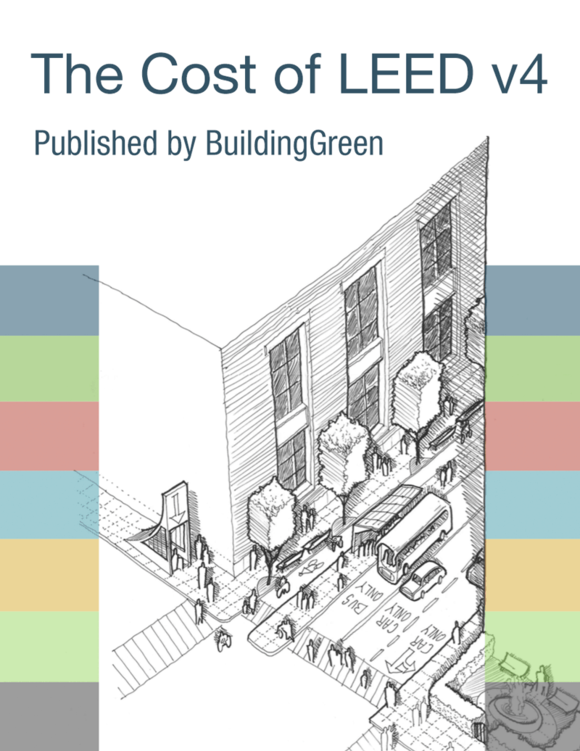Mid-Rise-v4 LTc5: Access to transit
LEEDuser overview
Explore this LEED credit
Post your questions on this credit in the forum, and click on the credit language tab to review to the LEED requirements.
Credit language

© Copyright U.S. Green Building Council, Inc. All rights reserved.
Intent
To reduce pollution and land development effects from automobile use.
Requirements
Locate the project within a ¼-mile (400 meter) walking distance of bus or streetcar stops, or within a ½-mile (800 meter)walking distance of bus rapid transit stops, light or heavy rail stations, or ferry terminals. The transit service at those stops in aggregate must meet the minimums listed in Table 1 or Table 2.
- A bus or streetcar stop must serve a route that extends in opposite directions; the walking distance can be the average distance to the two stops.
- A single stop that serves as the terminal for a transit route can be counted.
- Trips in opposite directions are counted separately.
- Only one stop per route in a given direction can be counted.
Table 1. Minimum daily transit service for projects with multiple transit types (bus, streetcar, rail, or ferry)
| Weekday trips | Weekend trips | Points |
|---|---|---|
| 72 | 40 | 1 |
| 144 | 108 | 1.5 |
| 360 | 216 | 2 |
Table 2. Minimum daily transit service for projects with commuter rail or ferry service only
| Weekday trips | Points |
|---|---|
| 24 | 1 |
| 40 | 1.5 |
| 60 | 2 |
What does it cost?
Cost estimates for this credit
On each BD+C v4 credit, LEEDuser offers the wisdom of a team of architects, engineers, cost estimators, and LEED experts with hundreds of LEED projects between then. They analyzed the sustainable design strategies associated with each LEED credit, but also to assign actual costs to those strategies.
Our tab contains overall cost guidance, notes on what “soft costs” to expect, and a strategy-by-strategy breakdown of what to consider and what it might cost, in percentage premiums, actual costs, or both.
This information is also available in a full PDF download in The Cost of LEED v4 report.
Learn more about The Cost of LEED v4 »For full access, sign up now for LEEDuser Premium
Already a premium member? Log in now
Checklists
Step by step to LEED certification
LEEDuser’s checklists walk you through the key action steps you need to earn a credit, including how to avoid common pitfalls and save money.
For full access, sign up now for LEEDuser Premium
Already a premium member? Log in now
Documentation toolkit
The motherlode of cheat sheets
LEEDuser’s Documentation Toolkit is loaded with calculators to help assess credit compliance, tracking spreadsheets for materials, sample templates to help guide your narratives and LEED Online submissions, and examples of actual submissions from certified LEED projects for you to check your work against. To get your plaque, start with the right toolkit.
For full access, sign up now for LEEDuser Premium
Already a premium member? Log in now
Credit language

© Copyright U.S. Green Building Council, Inc. All rights reserved.
Intent
To reduce pollution and land development effects from automobile use.
Requirements
Locate the project within a ¼-mile (400 meter) walking distance of bus or streetcar stops, or within a ½-mile (800 meter)walking distance of bus rapid transit stops, light or heavy rail stations, or ferry terminals. The transit service at those stops in aggregate must meet the minimums listed in Table 1 or Table 2.
- A bus or streetcar stop must serve a route that extends in opposite directions; the walking distance can be the average distance to the two stops.
- A single stop that serves as the terminal for a transit route can be counted.
- Trips in opposite directions are counted separately.
- Only one stop per route in a given direction can be counted.
Table 1. Minimum daily transit service for projects with multiple transit types (bus, streetcar, rail, or ferry)
| Weekday trips | Weekend trips | Points |
|---|---|---|
| 72 | 40 | 1 |
| 144 | 108 | 1.5 |
| 360 | 216 | 2 |
Table 2. Minimum daily transit service for projects with commuter rail or ferry service only
| Weekday trips | Points |
|---|---|
| 24 | 1 |
| 40 | 1.5 |
| 60 | 2 |

